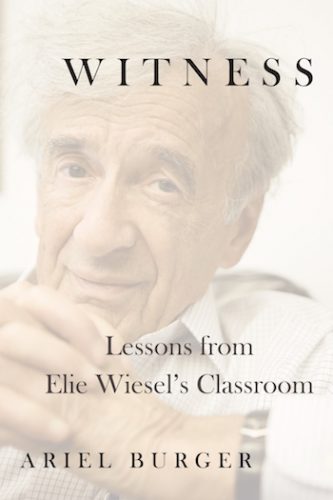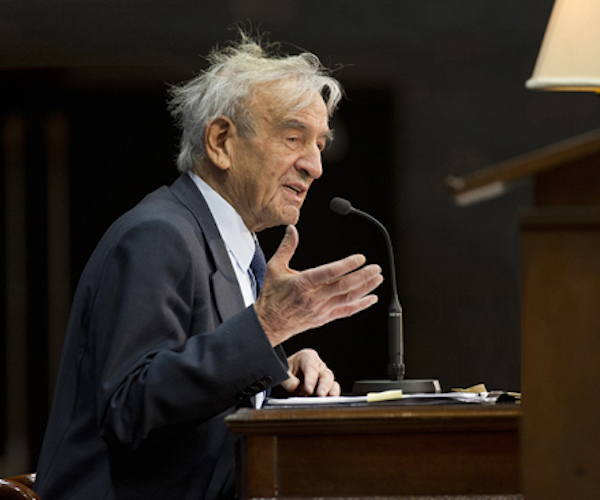Book Review: Learning from the Master — Elie Wiesel
By Susan Miron
Witness: Lessons from Elie Wiesel’s Classroom by Ariel Burger. Houghton Mifflin Harcourt, 288 pages, $26.

Like many of Elie Wiesel’s students, the young Ariel Burger came to his classroom looking for an intellectual and spiritual home. He had met Wiesel briefly as a teenager, but was too shy to approach him. When, years later, he began to study as a pupil of Wiesel’s (along with about 60 other fortunate students of all ages and backgrounds) he found the home he was seeking. Most of us who attended this unique classroom felt the same. We knew that the time we spent in Wiesel’s seminar would be a unique, transformative gift. Few left unchanged by the experience.
Burger perfectly captures the shared feeling that time spent in Wiesel’s crowded class room was precious. You were absorbing a universe of wisdom from one extraordinary human being. A teaching assistant for Wiesel’s classes at Boston University for five years, who then became Wiesel’s cherished friend and confidante, Burger was the ideal amanuensis to write this moving and insightful book. I was in Wiesel’s classroom for three semesters in the late ’80s, and the experience altered the trajectory of my life. He had the same, almost startling, effect on countless students he taught in his forty years at B.U. One student Burger writes about, Tracy, who later become a journalist who traveled to Lebanon and Syria to hear the stories of refugees, told Burger, “I still remember; I sat in his class, and I felt my future changing as he spoke.” Indeed.
Wiesel, the world’s most famous Holocaust survivor, was known, worldwide, for a variety of activities. He was celebrated as the author of Night, the first of his many books; won the Nobel Prize for Peace; was a world-renowned human rights activist as well as a hugely popular lecturer. (Of Night, Wiesel shrugged, “Sometimes I worry that all my other books are jealous of my first.”) But he was proudest of being a teacher.
Wiesel always believed in learning, and his quest as a teacher was to find “a hidden element, one that could fulfill education’s promise to protect against moral and ethical corruption.” After decades, he discovered this “new element; he called it memory.” (When I was a pupil of his, all of his diverse courses were tucked under the umbrella of The Literature of Memory). His favorite themes included hatred as madness, the indispensable value of memory, and the need for compassion.
Regardless of the texts being studied, Wiesel “helped us see the connections between literature and history, great books and our personal stories… to always seek the moral meaning of the text we read.” He felt people in his classes must tell their story (rather being paralyzed with humility in the presence of a world-class story-teller) because “If even one person learns from it how to be more human, you will have made your memories into a blessing. We must turn our suffering into a bridge so that the other might suffer less.” “I am not a judge; I am only a witness,” he often said.

Elie Wiesel speaking at Boston University in 2012. Photo: Vernon Doucette
Burger chose to attend Boston University because Wiesel taught there, but he asked the student to wait a year (until he was a sophomore) to take a class with him. Burger waited, studying furiously. Later, he was asked by Wiesel to be his teaching assistant. But Burger wanted desperately to study in Israel. This time, Wiesel said he would be the one to wait. Seven years later, now an ordained rabbi, with a wife and three very young children, Burger returned to work on a doctorate with Wiesel for five intellectually thrilling years.
Burger was presciently aware that he needed to put to paper (or computer) what was said — and by whom — in Wiesel’s classes. His notes sound as if they had been jotted down five minutes ago. To those who took Wiesel’s classes, every word in the volume has a wonderfully familiar ring. For those who never met the man, or know Wiesel only through his books, Burger’s book will be a joy, a multi-dimensional portrait of a master educator. Wiesel comes alive as if we he was in front of us. For me, memories came flooding back; one can hear him registering his doubts, questions, and advice. Burger has created an indelible portrait of both his beloved teacher and of his own fascinated self.
Susan Miron, a harpist, has been a book reviewer for over 20 years for a large variety of literary publications and newspapers. Her fields of expertise were East and Central European, Irish, and Israeli literature. Susan covers classical music for The Arts Fuse and The Boston Musical Intelligencer.

What a lovely – and perfect – review. Check out the Vimeo video of the Book Launch event for Witness at the Museum of Jewish Heritage on November 15, 2018. I was there, and it was extraordinary: Elisha’s introduction and Ariel’s talk. As Elie Wiesel’s Personal Assistant for 27 years, it was my privilege to be there.
Susan, this is an exceptionally beautiful essay, immediately recognizable by those of us fortunate to share the experience of learning our life lessons in that classroom. Thank you for your eloquence, which brings memory and joy to my heart.
Riki Lippitz